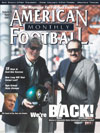AMERICAN FOOTBALL MONTHLY THE #1 RESOURCE FOR FOOTBALL COACHES
Article CategoriesAFM Magazine
|
Etched In StoneLongevity: Surviving the Test of Time© More from this issue Perhaps Super Bowl-winning head coach Jon Gruden, of Tampa Bay, said it best when describing the profession of coaching when he told American Football Monthly, “Coaches are like offensive linemen, you don’t hear much about them unless they are in the transactions section changing jobs.” Unfortunately that is sometimes the case, but the fact remains that coaching is still one of the most rewarding professions in the world, so what are the secrets to success? Or more importantly, what are the keys to longevity? After all, coaching is one of the most volitale careers anywhere. Coaches are rarely given enough credit when they win and are often given too much credit when they lose. In an era where one false step could be your last, implemen....The full article can only be seen by subscribers. Subscribe today!
|
|
|||||||
| HOME |
MAGAZINE |
SUBSCRIBE | ONLINE COLUMNISTS | COACHING VIDEOS |
Copyright 2026, AmericanFootballMonthly.com
All Rights Reserved





